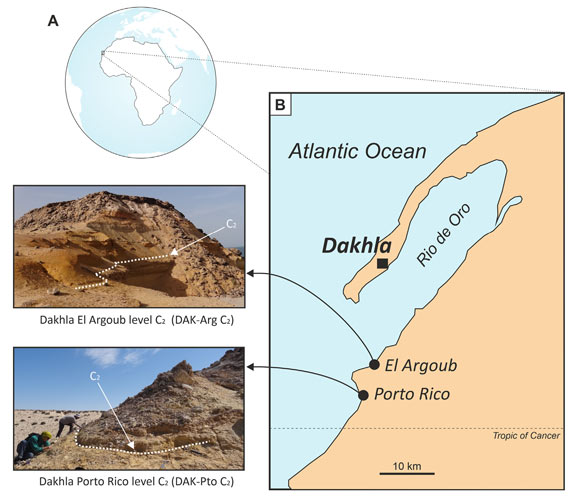June 2024: publication Journal of Human Evolution
A new primate community from the earliest Oligocene of the Atlantic margin of Northwest Africa: Systematic, paleobiogeographic, and paleoenvironmental implications
We report a new Paleogene primate community discovered in the uppermost part of the Samlat Formation outcropping on the continental shore of the Rio de Oro, east of the Dakhla peninsula (in the south of Morocco, near the northern border of Mauritania). Fossils consist of isolated teeth, which were extracted by wet screening of estuarine sediments (DAK C2) dating from the earliest Oligocene (ca. 33.5 Ma). These dental remains testify to the presence of at least eight primate species, documenting distinct families, four of which are among the Anthropoidea (Oligopithecidae [Catopithecus aff. browni], Propliopithecidae [?Propliopithecus sp.], Parapithecidae [Abuqatrania cf. basiodontos], and Afrotarsiidae [Afrotarsius sp.]) and four in the Strepsirrhini (a Djebelemuridae [cf. ‘Anchomomys’ milleri], a Galagidae [Wadilemur cf. elegans], a possible lorisiform [Orogalago saintexuperyi gen. et sp. nov.], and a strepsirrhine of indeterminate affinities [Orolemur mermozi gen. et sp. nov.]). This record of various primates at Dakhla represents the first Oligocene primate community from Northwest Africa, especially from the Atlantic margin of that landmass. Considering primates plus rodents (especially hystricognaths), the taxonomic proximity at the generic (even specific) level between DAK C2 (Dakhla) and the famous Egyptian fossil-bearing localities of the Jebel Qatrani Formation (Fayum Depression), either dating from the latest Eocene (L-41) or from the early Oligocene, suggests the existence of an east–west ‘trans-North African’ environmental continuum during the latest Eocene–earliest Oligocene time interval. The particularly diverse mammal fauna from DAK C2, recorded within the time window of global climate deterioration characterizing the Eocene/Oligocene transition, suggests that this tropical region of northwest Africa was seemingly less affected, if at all, by the cooling and associated paleoenvironmental and biotic changes documented at that time or at least that the effects were delayed. The expected densely forested paleoenvironment bordering the western margin of North Africa at the beginning of the early Oligocene probably offered better tropical refugia than higher latitudes or more inland areas during the cooling episode.

Figure 1. Geographic locations of the primate-yielding localities from lower Oligocene deposits on the Atlantic margin of Northwest Africa (current Dakhla region). A) simplified globe centered on Africa, locating the Dakhla peninsula and the Rio de Oro in the westernmost part of the Sahara (Atlantic Sahara; in the south of Morocco, near the northern border of Mauritania); B) location of the geological outcrops of interest (Porto Rico [Pto] and El Argoub [Arg]), which are exposed on the mainland shore of the Rio de Oro inlet, east of the peninsula. The fossil-bearing localities, Porto Rico U4 level C2 (DAK-Pto C2) and El Argoub U4 level C2 (DAK-Arg C2), are situated directly east of the Dakhla city (ca. 13 km and ca. 10 km, respectively). On the two photographs (by L.M.), the dashed white lines indicate the fossil-bearing level C2, which consists of a ∼30-cm-thick unconsolidated sandy microconglomerate. In both sections (Pto and Arg), this level has yielded a similar fossil assemblage of marine and estuarine invertebrates (lamellibranches) and vertebrates (including fishes, turtles, crocodiles, and abundant elasmobranchs), together with terrestrial mammals (Marivaux et al., 2017a, 2017b, 2019; Benammi et al., 2019).
References
Marivaux L., Benammi M., Baidder L., Saddiqi O., Adnet S., Charruault A.-L., Tabuce R., Yans J., Benammi M. 2024 – A new primate community from the earliest Oligocene of the Atlantic margin of Northwest Africa: Systematic, paleobiogeographic, and paleoenvironmental implications – Journal of Human Evolution 193, 103548 – https://doi.org/10.1016/j.jhevol.2024.103548




